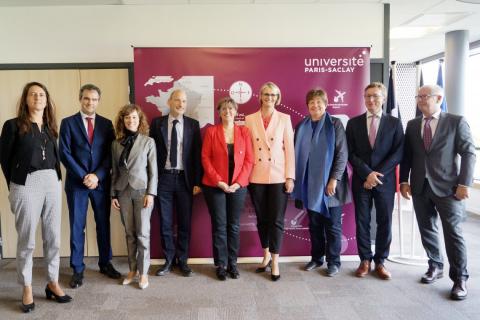
Université Paris-Saclay hosts the German Minister of Education and Research
Within the framework of abundant cooperation between France and Germany, the president of Université Paris-Saclay, Sylvie Retailleau, welcomed the German Minister of Education and Research, Anja Karliczek, for an afternoon of meetings.
Invited to open the kick-off conference of the Make Our Planet Great Again programme, which aims to reinforce international engagement around the Paris Agreement, on October, 1st in Paris, with the French Minister of Higher Education, Research and Innovation, Frédérique Vidal, the German Minister of Education and Research, Anja Karliczek, was hosted at Université Paris-Saclay (UPSaclay) to meet with the players involved in the areas of climate, artificial intelligence, quantum research and the implementation of the European university EUGLOH.
Germany - First scientific partner of Université Paris-Saclay
Germany is the first scientific partner of Université Paris-Saclay in Europe and the second in the world. Cooperation is intense with Germany and all the member institutions of the university.
In number of co-authored publications, the country is also the first partner of the CEA which has contributed to 500 projects with German partners within the framework of the 7th Framework Programme for Research and Technological Development. Furthermore, half the projects submitted by the CEA between 2014 and 2017 were with German teams. As for the CNRS, it is involved in 7 active International Research Networks-IRN (4 IRN between 2010 and 2018) with German partners, in particular in astrophysics, nuclear physics, and material science.
The current context is particularly conducive to Franco-German cooperation, in particular with the support of the Joint declaration of intent published following the 6th Forum on Franco-German Research Cooperation last June in Berlin. Priority areas were identified: energy, climate and sustainable development, artificial intelligence and quantum research.
A context conducive to Franco-German cooperation
Over the past 5 years, UPSaclay has been involved or is involved in 231 H2020 projects with one or more German partners, mainly in astrophysics, material sciences, and energy, including 41 Innovative Training Networks. There are also many cooperation agreements between UPSaclay member institutions and German partners at all levels of education, and in a variety of areas of research, with the implementation of programmes and networks on a wider scale. The ENS Paris-Saclay is part of an international research network in computer engineering (International Research Training Group), the IRTG ViVaCE, and via the Franco-German University of several networks with German institutions such as the French-German Doctoral College Sophisticated Numerical and Testing Approaches. An international doctoral programme "MyoGrad", which provides high-level training in fundamental and medical myology has been established by the Health Sciences teaching and training unit (Université Versailles Saint Quentin-en-Yvelines) in cooperation with two German partners (Charité Universitätsmedizin and the Max Delbrück Center for Molecular Medicine, in Berlin).
The recent launch of the European University EUGLOH – European University Alliance for Global Health coordinated by UPSaclay with four of its partners, including Ludwig-Maximilian University in Munich, focused on training aroung global health and well-being, will involve players from all fields, from medicine to the environnement through to digital sciences and humanities.
Last August, Université Paris-Saclay hosted the first edition of the Quantum Future Academy
in partnership with Karlsruher Institut für Technologie, the University of Strasbourg and Universität des Saarlandes. During the academy, 30 students from both countries discovered 4 French and German leading sites in quantum research, participated in high-level conferences and met with political players and representatives of French, German and international companies.
Within this framework, the themes to be discussed in the course of the afternoon were numerous. The minister was able to meet with Elsa Cortijo, Director of the LSCE (Laboratory for Sciences of Climate and Environment), the director of the UPSaclay ICT department, Michel Beaudoin-Lafon, the director of the CMLA (Center for MathematicaL studies and their Applications - ENS Paris-Saclay), Nicolas Vayatis, who presented the industrial chair on quantum IT "Nasniq",
Pascale Sennelart-Mardon, coordinator of quantum sciences and technologies at UPSaclay, as well as the coordinator of EUGLOH, Sandrine Lacombe. The minister was also able to meet two German PhD candidates hosted at UPSaclay within a co-tutelle agreement and discuss their experience at the university.
Following the meeting, the minister was welcomed at Neurospin, where she discovered the activities of the centre on the brain and MRI, with a presentation of the MRI magnet Iseult, born from a Franco-German collaboration, and which recently beat the ramp-up record.
